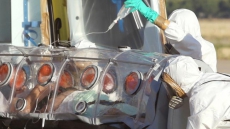The 'Angelina Effect' has more than doubled the genetic counselling and testing for breast cancer risk among British women.
The 'Angelina Effect' is a term coined after actor Angelina Jolie underwent a double mastectomy after being tested positive for a BRCA1 gene mutation that may lead to breast cancer.
New research based on data from 21 health centres in Britain shows that many more women approached their physicians with concerns.
"Far from these being women with unfounded concerns, it was women with a family history of breast cancer, which translated into appropriate referrals for testing,” said Gareth Evans, professor of clinical genetics from Genesis Breast Cancer Prevention, a breast cancer charity specialising in breast cancer research.
BRCA1 mutation is inherited from a parent and is the cause of at least 10 percent of breast cancers.
"Although there was concern that the increase in attendance following Jolie's announcement might have been from the 'worried well' coming back for an early repeat screen, our research found that the opposite was true,” she added.
A higher proportion was from women who were late for their test, rather than those who were coming back early, Evans noted.
Women who have the BRCA1 gene mutation have between 45 percent and 90 percent risk of developing breast cancer in their lifetime.
If you have a strong family history of breast cancer and a living relative with breast cancer, it is possible to test for the mutation.
The research, published in the journal Breast Cancer Research, was funded by Breast Cancer Campaign.





